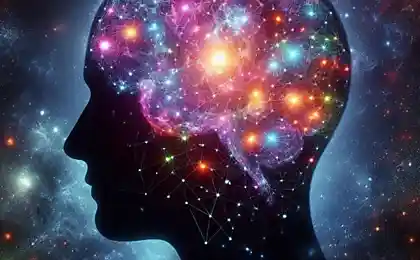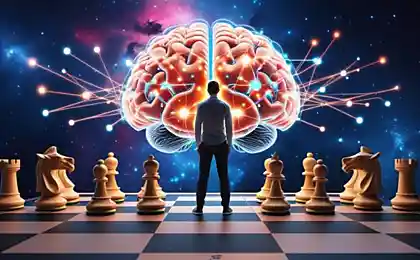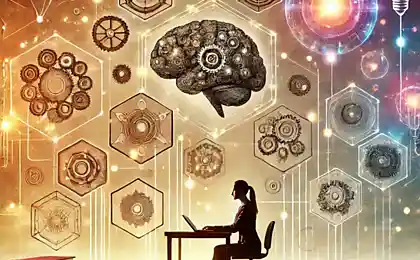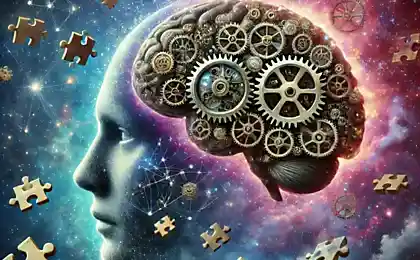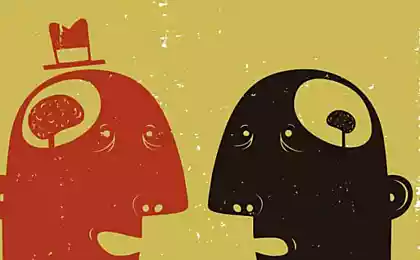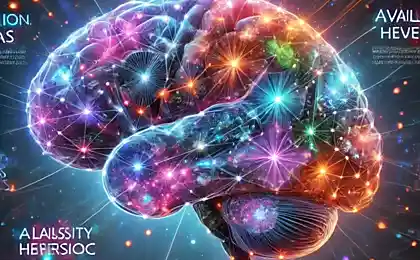411
10 traps of our thinking
Cognitive distortions — repeated error in human thinking,. It is the patterns of thinking, certain logical trap in which we find ourselves in certain situations, although we know that they are acting according to common sense. We have collected for You in one article 10 traps, but not to You they got.

The illusion of control
Was opened by Ellen Langer in 1975, during the experiments with lottery tickets. The participants were divided into two groups: the first group chose a ticket, the second gave them no choice. Two days later, all participants were asked to swap their tickets for the more profitable of lottery with great odds of winning. Offer the best, isn't it? But those who picked the ticket didn't want to change, imagining that their own choice the ticket can affect winnings.
Conclusion: People tend to overestimate their influence on events in the successful outcome of which they are interested.
Zero risk
Make the choice to reduce a small risk to zero or to reduce a huge risk significantly but not to zero. For example, to reduce to absolute zero the crash or drastically reduce the number of traffic accidents. Choose?
True to be the second option. As it will save a lot more lives in car accidents perishes much more passengers than in air. But! Research shows that the majority are choosing option No. 1: zero risk, at least in some area seems to be more soothing, even if your chances of becoming a victim of a plane crash are negligible.
Selective perception
Let's say you are against GMOs. You most likely are interested in and read the news about it. While reading, you sure are right: the danger is obvious. What's the catch? That you rather segolame much more attention to news that confirms your point of view, than the arguments in favor of GMOs. So you are losing objectivity. The tendency to give preference to such information, which meets expectations, and ignore all the rest of it is selective perception.
The illusion of transparency
There are times when you simply need to lie. But it turns out to be very difficult, it seems that you are an open book and you can see right through any incorrect gesture can give your dishonesty. Used to this? The name of this "illusion of transparency" — the tendency of people to overestimate the ability of others to understand their true motives and feelings.
1998, Cornell University. The psychologists ran the experiment on the students. Some of the students to read the questions from the cards and answered them, saying true or false, as it is written in the card. The audience was asked to establish when the speakers are lying, and the speakers were asked to assess their chances to lie and "could not sleep". 50 percent of the liars assumed that they were see through — but listeners were able to expose only a quarter.
This means that those who lied, greatly overestimated the shrewdness of his listeners. This happens because we know ourselves well and I think that our knowledge is obvious to another observer. The illusion of transparency works in the opposite direction: we over-estimate their ability to recognize the lies of others.
The Barnum Effect
This effect was named after American showman and a clever manipulator of the 20th century Phineas Barnum. Its essence is that people tend to accept vague and General descriptions as the exact characteristics of your personality.
For example, you don't believe in pseudoscience, but bumping into a horoscope, for the sake of reading it and the description matches exactly with your idea about yourself. This happens even with the naysayers, this effect is used by the astrologers and fortune-tellers.
The effect of negativity
Negative news always attracts more attention than positive. This does not mean that we are pessimists. In the case of evolution, because in the process of reaction to bad news was more correct than active reaction to good. The sentence "these berries are delicious" you can skip past the ears. But the words "this berry is poisonous" would react any. Hence the selectivity of our perception of new information. Negative information we believe is more reliable.
Now the number of wars and the crime rate on the planet is lower than ever in history. But almost all agree that the situation on the planet is getting worse every day.
The effect of self-fulfilling prophecy
The essence of this cognitive distortion, operating on the hands of the prophets, that the false prophecy(if it sounds good) can push people unknowingly take steps for its performance. As a result, the prophecy that had little chance, it suddenly becomes true.
The classic version of this prophecy is described in the story of Alexander green "Scarlet sails". Fibber Aigle predicts little Assol that when she grows up, it will arrive the Prince on a ship with scarlet sails. Assol fervently believes in the prophecy and it becomes known all over town. And then fell in love with a girl captain gray learns about the prophecy and decides to realize the dream of Assol. And in the end Aigle is right, although a happy end in the history provided not fairy mechanisms.
The fundamental error of attribution
We justify their mistakes objective circumstances, the behavior of others — their personal qualities. For example, your colleague is late due to non-punctuality, and you — because of traffic jams or a broken alarm clock. And it concerns not only external, formal situations, but also on internal reasons — such tactics for life gives us to take responsibility for their misdeeds.
The effect of moral trust
The priest took a bribe or was seen in a strip bar. In this extraordinary situation, there is a pattern. Its name — "the effect of moral trust". When some person has a reputation of a righteous man, he one day may be an illusion that he is sinless, and once will not change anything in this illusion.
It's interesting:
How your body tells you what you really want
Do not like the outcome — change their behavior
The cascade of available information
This cognitive distortion are required, many ideologues of the planet Earth: collective faith in the idea becomes much more convincing if this idea constantly repeated. The phenomenon we encounter in conversations with the elderly: what is written in the newspaper or shown on TV is the truth! The new generation of a similar situation with the Internet.
P. S. And remember, only by changing their consumption — together we change the world! ©
Source: reklamaster.com/business-and-innovations/10-kapkanov-nashego-myshlenija

The illusion of control
Was opened by Ellen Langer in 1975, during the experiments with lottery tickets. The participants were divided into two groups: the first group chose a ticket, the second gave them no choice. Two days later, all participants were asked to swap their tickets for the more profitable of lottery with great odds of winning. Offer the best, isn't it? But those who picked the ticket didn't want to change, imagining that their own choice the ticket can affect winnings.
Conclusion: People tend to overestimate their influence on events in the successful outcome of which they are interested.
Zero risk
Make the choice to reduce a small risk to zero or to reduce a huge risk significantly but not to zero. For example, to reduce to absolute zero the crash or drastically reduce the number of traffic accidents. Choose?
True to be the second option. As it will save a lot more lives in car accidents perishes much more passengers than in air. But! Research shows that the majority are choosing option No. 1: zero risk, at least in some area seems to be more soothing, even if your chances of becoming a victim of a plane crash are negligible.
Selective perception
Let's say you are against GMOs. You most likely are interested in and read the news about it. While reading, you sure are right: the danger is obvious. What's the catch? That you rather segolame much more attention to news that confirms your point of view, than the arguments in favor of GMOs. So you are losing objectivity. The tendency to give preference to such information, which meets expectations, and ignore all the rest of it is selective perception.
The illusion of transparency
There are times when you simply need to lie. But it turns out to be very difficult, it seems that you are an open book and you can see right through any incorrect gesture can give your dishonesty. Used to this? The name of this "illusion of transparency" — the tendency of people to overestimate the ability of others to understand their true motives and feelings.
1998, Cornell University. The psychologists ran the experiment on the students. Some of the students to read the questions from the cards and answered them, saying true or false, as it is written in the card. The audience was asked to establish when the speakers are lying, and the speakers were asked to assess their chances to lie and "could not sleep". 50 percent of the liars assumed that they were see through — but listeners were able to expose only a quarter.
This means that those who lied, greatly overestimated the shrewdness of his listeners. This happens because we know ourselves well and I think that our knowledge is obvious to another observer. The illusion of transparency works in the opposite direction: we over-estimate their ability to recognize the lies of others.
The Barnum Effect
This effect was named after American showman and a clever manipulator of the 20th century Phineas Barnum. Its essence is that people tend to accept vague and General descriptions as the exact characteristics of your personality.
For example, you don't believe in pseudoscience, but bumping into a horoscope, for the sake of reading it and the description matches exactly with your idea about yourself. This happens even with the naysayers, this effect is used by the astrologers and fortune-tellers.
The effect of negativity
Negative news always attracts more attention than positive. This does not mean that we are pessimists. In the case of evolution, because in the process of reaction to bad news was more correct than active reaction to good. The sentence "these berries are delicious" you can skip past the ears. But the words "this berry is poisonous" would react any. Hence the selectivity of our perception of new information. Negative information we believe is more reliable.
Now the number of wars and the crime rate on the planet is lower than ever in history. But almost all agree that the situation on the planet is getting worse every day.
The effect of self-fulfilling prophecy
The essence of this cognitive distortion, operating on the hands of the prophets, that the false prophecy(if it sounds good) can push people unknowingly take steps for its performance. As a result, the prophecy that had little chance, it suddenly becomes true.
The classic version of this prophecy is described in the story of Alexander green "Scarlet sails". Fibber Aigle predicts little Assol that when she grows up, it will arrive the Prince on a ship with scarlet sails. Assol fervently believes in the prophecy and it becomes known all over town. And then fell in love with a girl captain gray learns about the prophecy and decides to realize the dream of Assol. And in the end Aigle is right, although a happy end in the history provided not fairy mechanisms.
The fundamental error of attribution
We justify their mistakes objective circumstances, the behavior of others — their personal qualities. For example, your colleague is late due to non-punctuality, and you — because of traffic jams or a broken alarm clock. And it concerns not only external, formal situations, but also on internal reasons — such tactics for life gives us to take responsibility for their misdeeds.
The effect of moral trust
The priest took a bribe or was seen in a strip bar. In this extraordinary situation, there is a pattern. Its name — "the effect of moral trust". When some person has a reputation of a righteous man, he one day may be an illusion that he is sinless, and once will not change anything in this illusion.
It's interesting:
How your body tells you what you really want
Do not like the outcome — change their behavior
The cascade of available information
This cognitive distortion are required, many ideologues of the planet Earth: collective faith in the idea becomes much more convincing if this idea constantly repeated. The phenomenon we encounter in conversations with the elderly: what is written in the newspaper or shown on TV is the truth! The new generation of a similar situation with the Internet.
P. S. And remember, only by changing their consumption — together we change the world! ©
Source: reklamaster.com/business-and-innovations/10-kapkanov-nashego-myshlenija



